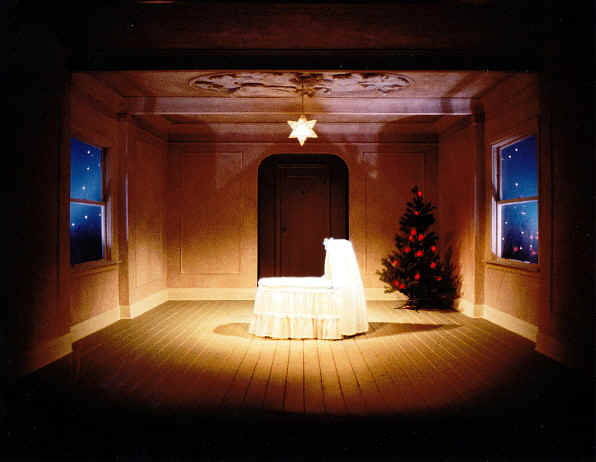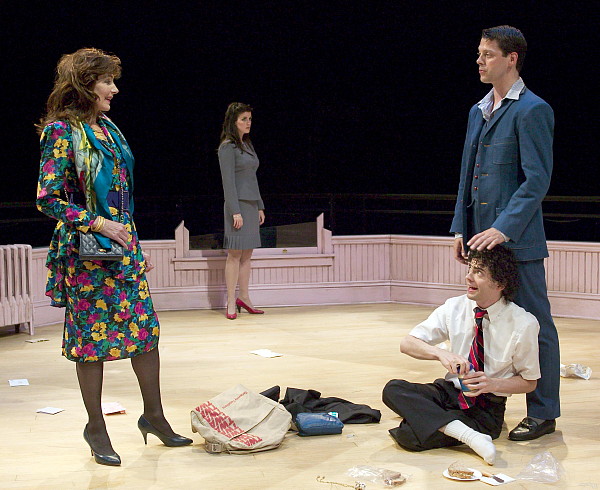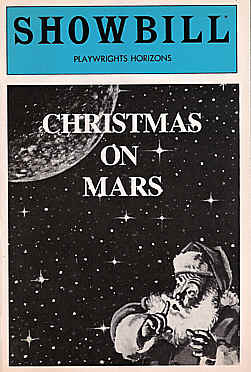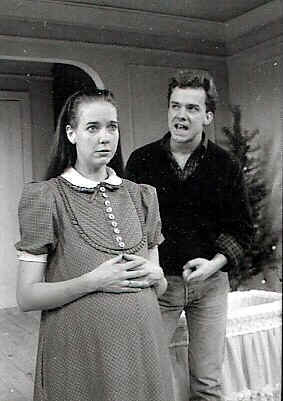Christmas on Mars
Set in a bright, starkly bare apartment, the action centers on a young couple, Bruno and Audrey, who are planning to marry now that Audrey is pregnant. In order to pay the rent Bruno has invited Audrey’s mother, Ingrid (whom Audrey detests), to move in with them, but he is not prepared for the unexpected arrival of his lifelong friend Nissim who, upon learning of the expected birth, announces that he will also stay on. He, like the others, looks to the baby for redemption from the disappointments and emptiness of his own life and the hope, at last, of pure and ennobling love. It is in the barbed and very funny exchanges of these four unlikely roommates that the more serious concerns of the play are shadowed, culminating, after Audrey has departed for the hospital, in a bizarre but genuinely moving scene in which the wonder and promise of the Nativity are strikingly invoked.
Production History:
Christmas on Mars was first produced in New York City in 1983 by Playwrights Horizons (Andre Bishop, artistic director; Paul Daniels, managing director). Directed by Andre Ernotte. Sets by Andrew Jackness. Costumes by Rita Ryack. Lighting by James F. Ingalls. Production Stage Manager: J. Thomas Vivian. The cast was:
Bruno: Michael O’Keefe
Audrey: Harriet Harris
Nissim: Joe Pichette
Ingrid: Marie Cheatham
The play has had many productions around the world since then, including a major revival at the Old Globe Theater in San Diego in 2006.
Reviews:
New York Times review by Frank Rich, June 3, 1983
San Francisco Weekly review by Michael Scott Moore, August 11, 1999
San Diego Union-Tribune review by Anne Marie Welsh, June 10, 2006
Published:
Dramatists Play Service, 1983.
Self Torture and Strenuous Exercise: The Selected Plays of Harry Kondoleon, Theater Communications Group, 1991.
Excerpt:
click here. (Google excerpt)
Production photos:

Andrew Jackness’s set for the Playwrights Horizons production

Colette Kilroy, Sarah Grace Wilson, Jack Ferver and David Furr in the San Diego production. (Photo by Craig Schwartz)
If you’ve ever seen or worked on this show and would like to share your experience, please comment below.



What I remember most about Harry, and this might sound odd when referring to a writer, is his eyes. He had the widest brown eyes, they seemed perpetually open, and his writing had a similar wide-eyed perspective. Imagine a play whose female protagonist gets the opportunity to literally walk on her mother after an initially thrown away aside that went something like, “What do you want to do? Walk all over me?” To which the female lead replies, “Yes. I do.” One look at the picture of me above will tell you that the play was done years ago, sometime in the 20th Century, if I recall, and that I used to have great hair. I’ve forgotten most of other happenings of that time but I must say, Harry had the most beautiful brown eyes.
There was something special and so different about Harry. I was flattered when he gave me one of his scripts to read and comment on; and even more flattered when he suggested I design Christmas on Mars at Playwrights two years later. That was the first show where I went to auditions, and I was sitting behind Harry at the end of one hapless actress. He slightly turned his head, flipped his wrist and said “Paraphrasing.”
The way he spoke was unique, and I spent time trying to perfect an imitation which I would do with some special friends all speaking the same way. My memory is very dim, but it went something like this:
1 tilt your head to the side and down
2 lower your eyelids…a little
3 tighten your throat and let as little air out as possible
4 speak 1/2 an octave higher than your normal range
5 the world makes you very tired, but ask for every bit of gossip
6 every third word should start low and end higher or perhaps have a slight wobble at the end.
7 Now say “you wait here while I go back in the house and put the head back on.” or “Your hair lacks luster.” or “You named me after your cat?”
The longer one spent with Harry’s work, the more intricate and complex it became, the lines indelible. Everyone of us who made his plays fell in love with each one of them and him.